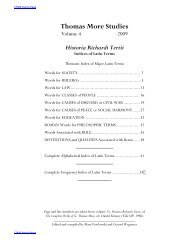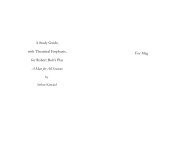life of john picus earl of mirandola - The Center for Thomas More ...
life of john picus earl of mirandola - The Center for Thomas More ...
life of john picus earl of mirandola - The Center for Thomas More ...
Create successful ePaper yourself
Turn your PDF publications into a flip-book with our unique Google optimized e-Paper software.
<strong>The</strong> mind <strong>of</strong> the<br />
wicked is never in<br />
quiet<br />
Evil company<br />
[81]<br />
30 <strong>Thomas</strong> <strong>More</strong>’s Life <strong>of</strong> John Picus<br />
paineth us? Doubtest thou, my son, whether the minds <strong>of</strong> wicked men<br />
be vexed or not with continual thought and torment?— it is the word<br />
<strong>of</strong> God, Which 1 neither may deceive nor be deceived: 2 Cor impii quasi<br />
mare fervens quod quiescere non potest, —“<strong>The</strong> wicked man’s heart is like a<br />
stormy sea, that may not rest.” 3 <strong>The</strong>re is to him nothing sure, nothing<br />
peaceable, but all things fearful, all things sorrowful, all things deadly.<br />
Shall we then envy these men? Shall we follow them¦ and <strong>for</strong>getting<br />
our own country, heaven, and our heavenly Father, where we were free<br />
born, shall we wilfully make ourselves their bondmen, and with them<br />
wretchedly living more wretchedly die, and at the last most wretchedly<br />
in everlasting fire be punished? Oh the dark minds <strong>of</strong> men! Oh the<br />
blind hearts! Who seeth not more clear than light that all these things<br />
be (as they say) truer than truth itself? 4 And yet do we not that that we<br />
know is to be done. In vain we would pluck our foot out <strong>of</strong> the clay,<br />
but we stick still. <strong>The</strong>re shall come to thee, my son, doubt it not (in<br />
these places namely where thou art conversant) 5 innumerable impediments<br />
every hour which might fear thee from the purpose <strong>of</strong> good<br />
and virtuous living and (but if thou beware) shall throw thee down<br />
headlong. But among all things the very deadly pestilence is this: to be<br />
conversant day and night among them whose <strong>life</strong> is not only on every<br />
side an allective° to sin, but over that all set in the expugnation° <strong>of</strong><br />
virtue, under their captain the devil, under the banner <strong>of</strong> death, under<br />
the stipend <strong>of</strong> hell, fighting against heaven, against our Lord God and<br />
against His Christ. But cry thou there<strong>for</strong>e with the prophet: Dir umpamus<br />
vincula eorum et projiciamus a nobis jugum ipsorum—“Let us break the bands<br />
<strong>of</strong> them and let us cast <strong>of</strong>f the yoke <strong>of</strong> them.” 6 <strong>The</strong>se be they whom<br />
⌐ (as the glorious apostle Saint Paul saith) ¬ our Lord hath delivered into<br />
the passions <strong>of</strong> rebuke and to a reprovable sense, to do those things<br />
that are not convenient, full <strong>of</strong> all iniquity, full <strong>of</strong> envy, manslaughter,<br />
contention, guile, and malice, backbiters, odious to God, contumeli-<br />
21 allective enticement / expugnation conquest<br />
¦ 7 <strong>More</strong> omits obliti propriae dignitatis, “shall we <strong>for</strong>get our own dignity” (CW 1:344, 345).<br />
1. Which: As Edwards notes, the Latin makes it clear that the antecedent is “God,” not “word”<br />
(CW 1:230).<br />
2. neither…deceived: Edwards claims that the Latin phrase from the original (qui nec falli potest nec<br />
fallere) derives ultimately from St. Augustine’s Enarrationes in Psalmos 88.2.6.45 (CW 1:230).<br />
3. Cor…rest: Isaiah 57:20.<br />
4. truer than truth itself: <strong>More</strong>’s rendering <strong>of</strong> the Latin proverb, ipsa veritate veriora, found in<br />
Gianfrancesco’s original text (CW 1:230).<br />
5. in…conversant: <strong>More</strong>’s translation <strong>of</strong> in quibus habitas, “in the places where you dwell” (CW<br />
1:344, 345).<br />
6. Dirumpamus…them: Psalm 2:3.<br />
5<br />
10<br />
15<br />
20<br />
25<br />
30











